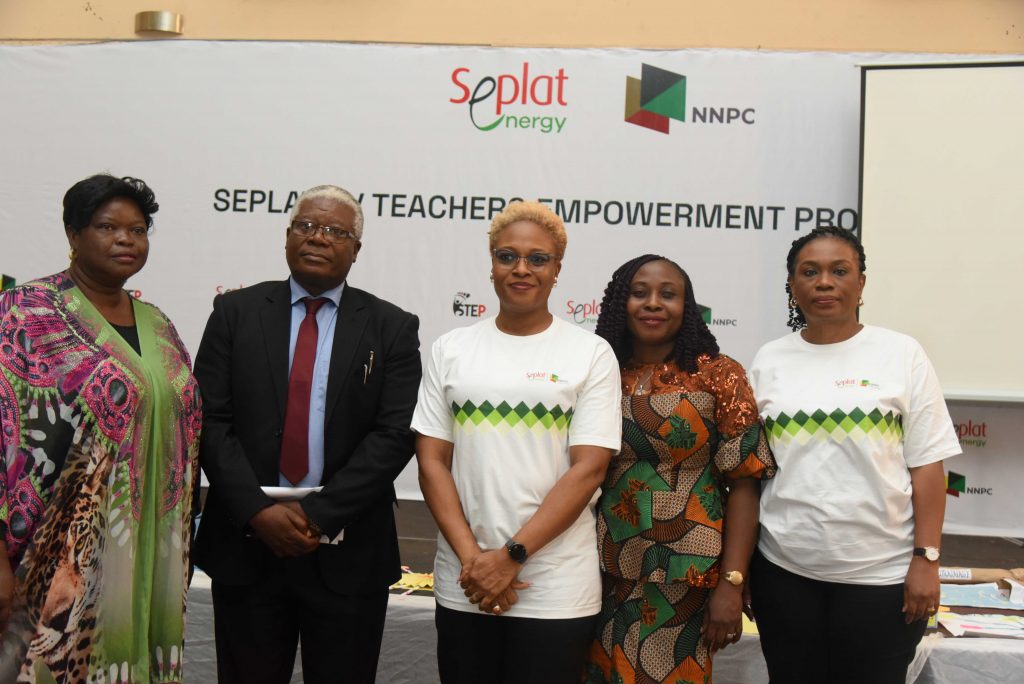News
Seplat Energy Flags Off 4th Edition of STEP CSR Initiative
AJAGBE ADEYEMI TESLIM
SPONSORED BY: H&H
L-R: Director (Schools) Delta State Ministry of Education, Winifred Ighavbota; Community Adviser, Western Asset, NNPC E&P Ltd, Owunari Levi; Director, External Affairs & Sustainability, Seplat Energy Plc, Chioma Afe; Functioning Permanent Secretary, Edo State Ministry of Education, Ero Ugiagbe; and Corporate Social Responsibility Manager, Seplat Energy, Esther Icha, at the flag off of the Seplat Energy JV Seplat Teachers’ Empowerment Programme (STEP) 2023 edition in Benin … on Wednesday
The programme is hinged on the JV’s continued quest to contribute towards the improvement of quality education in host communities and states, and by extension Nigeria.
STEP is designed to promote teacher’s creative thinking, provide training on teaching applications for Science, Technology, Engineering, Arts and Mathematics (STEAM), provide leadership and self-improvement training, allow for higher student’s engagement, and offer a well-rounded education for recipients of the programme. For this edition, 350 teachers have been listed for the programme.
The programme is targeted at secondary school teachers in public and private schools in Delta & Edo states, including the company’s host communities. During the programme, the teachers undergo 5 months of training, facilitated by a technology-based platform and gadgets provided by Seplat Energy.
In her opening remark, the Director of External Affairs & Sustainability, Seplat Energy Plc, Chioma Afe, noted that, “It is interesting that we are not just doing something for students, we are also doing something for schools and for the teachers. We are looking at the entire education ecosystem, working with the relevant state ministries and with our partners, the NEPL, to see how we can really impact every single part of that ecosystem and I think that’s an amazing thing.”
The Edo State Commissioner for Education Dr. Joan Oviawe, represented by the Functioning Permanent Secretary, Edo State Ministry of Education, Mrs. Ero Ugiagbe, expressed her heartfelt appreciation to Seplat Energy and its partners for their exceptional dedication to education, exemplified, not only through the Seplat Teachers’ Empowerment Programme, but also through their remarkable commitment to the development of schools in the states.
The Honourable Commissioner for Basic and Secondary Education, Delta State, Mrs. Rose Ezewu, represented by the Director (Schools) Delta State Ministry of Education, Mrs. Winifred Ighavbota, commended the efforts of the NEPL/Seplat JV, saying “For several years, the JV had upheld this Corporate Social Responsibility in the education sector in Edo and Delta states, being their host states. There is no doubt that these efforts and commitment to this noble project have contributed immensely in enhancing and sustaining the quality of education in both states.”
Expressing joy and fulfilment, one of the participants, Atsenuwa Beauty noted that “As teachers, we have been empowered and enlightened to see new innovative ways of doing the business of building destinies. I want to appreciate Seplat JV because it is one thing to have an idea and another thing to execute it and execute it well. That’s why we are seeing the magnitude of success being experienced here today and so, we are thankful.
Another participant, Awaritakpor Precious, also noted that, “Growing up, we were meant to understand that the teachers’ reward is in heaven. But Seplat is saying ‘No’, that the heaven is here. This is teachers’ heaven, courtesy of Seplat.”
Mr. Owunari Levi, Community Adviser, Western Asset who represented the Managing Director NEPL said, “To our wonderful partners in this journey of giving back to society (Seplat Energy), I want to say what you are doing has given us opportunity to operate better, reason being that we have just got another Freedom to Operate in Delta and Edo States.”
The STEP programme is designed to train secondary school teachers on skills, innovations, and technologies for deploying STEAM to deliver tutelage better to the students; provide and connect teachers to a collection of STEAM resources to enable them to understand, apply and innovate, as well as provide schools with resources to enable them to provide the right environment for STEAM implementation to enable students engage in the interdisciplinary nature of STEAM.

